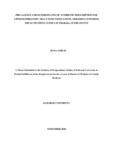PREVALENCE AND DETERMINANTS OF ANTIBIOTIC PRESCRIPTION FOR UPPER RESPIRATORY TRACT INFECTIONS AMONG CHILDREN ATTENDING THE OUTPATIENT CLINICS IN THARAKA-NITHI COUNTY
Abstract
Upper respiratory tracts (URTI) are acute, self-limiting infection. In 80% of cases, the cause is viral. Consequently, routine antibiotics prescribing to treat URTIs is not justified as they have no clinical benefit and can contribute to antimicrobial resistance (AMR). However, clinicians are frequently prescribing antibioticswith no indication. AMR is one of the principal threats to public health throughout the world. This sequential explanatory study aimed to examine the prevalence of antibiotic prescriptions among under-fives with URTI and to determine the factors influencing prescriptions in Tharaka-Nithi County, Kenya. The first phase was a retrospective chart review withthe calculation of prevalence and Odds ratio. The researcher did asystematic sampling of charts of under-fives treated from December 2018 to November 2019 in outpatient for URTI. Children with a clinically suspected bacterial infection were excluded. This study found that antibiotic prescribing was 70.4%, and it was significantly associatedwith having tonsillitis, the level of education of the prescriber and living close to the hospital. In the second phase, medical officers and clinical officers working in the pediatric outpatient wereinterviewed. A thematic analysisrevealed the following influencing factors: easy access to antibiotics, lack of clinical confidence, limited clinical knowledge and communication skills, tonsillitis and reported fever,the workload in the outpatient clinic,parent's pressure. The recommendations include the reinforcement of regulations of antibiotic use inand out of hospitals with effective stewardship programs; focus on training clinicians regarding the indications of antibiotics,and training of clinicians to communicate effectively with patients. Hospitals should consider to reduce the workload of clinicians and to avail diagnostic testing

